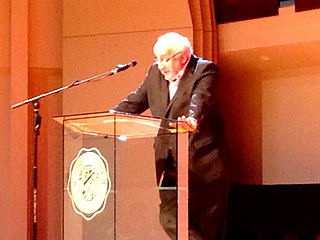A Quote by Richard J. Mouw
Here is Max De Pree at his best, and that is very good indeed. In Leading Without Power, De Pree shows us why we cannot master the how-to-dos of effective leadership without also being clear about what leaders?and followers?must be. In doing so, he not only provides us with much practical wisdom about creative leading and organizational health, he also nurtures our souls. This is a book to be savored by all who care about such things as vision, faithfulness, trust, and hope.
Quote Topics
About
Also
Being
Best
Book
Cannot
Care
Clear
Creative
Doing
Effective
Effective Leadership
Faithfulness
Followers
Good
Health
His
Hope
How
Indeed
Leaders
Leadership
Leading
Master
Max
Much
Must
Only
Organizational
Our
Power
Practical
Provides
Shows
Souls
Things
This Is A Book
Trust
Us
Very
Very Good
Vision
We Cannot
Why
Wisdom
Without
Related Quotes
Trust is perhaps the most critical single building block underlying effectiveness. Without trust leaders do not have followers. Without trust, leaders are impotent despite great rhetoric or splendid ideas. Trust rests on the belief among followers that the leader is transparent: What you see is what there is. Trust means followers believe there is no duplicity; no manipulation just to satisfy the leader's ego. Very simply: The effective leader is transparent; that's why that person is trusted.
Not many of us will be leaders; and even those who are leaders must also be followers much of the time. This is the crucial role. Followers judge leaders. Only if the leaders pass that test do they have any impact. The potential followers, if their judgment is poor, have judged themselves. If the leader takes his or her followers to the goal, to great achievements, it is because the followers were capable of that kind of response.
When you coach and teach leadership, most people think about them. It's like you're the leader and how do you influence them. Clearly, leaders do take their followers, their flock, their enterprise, their business - whatever - hopefully to a better place. But I think the foundation of what makes really great leaders is they lead themselves, and they're conscious about knowing themselves and coaching and leading themselves in a very profound way. The simplest of us talk to ourselves. The question is, "Do we really lead ourselves?"
But after about a year praying, there was just this clear direction. The leadership team believed that God was leading us to focus on fatherhood. If God is leading, then God will provide. So we begin to get storyline ideas that lined up with the subject of fatherhood that we're working on and fitting, and we were thinking, okay this is good. At the same time, as we are studying scriptures and we're on our journey as fathers, we are learning about fatherhood every day.
As we blossom or awaken, we begin to notice there is a force in the world that seems to be operating and leading us into a certain destiny. And it's very much a kind of detective effort on our own part to figure out what these things mean. The synchronicity is essentially a meaningful coincidence that brings us information at just the right time. While leading us forward, it also feels very inspiring and destined in a way. It feels like we're on a path of unfolding in our own personal evolution.
"Sabbath is not primarily about us or how it benefits us; it is about God, and how God forms us. It is not, in the first place, about what we do or don't do; it is about God - completing and resting and blessing and sanctifying. These are all things that we don't know much about......But it does mean stopping and being quiet long enough to see - open-mouthed - with wonder - resurrection wonder.....we cultivate the "fear of the Lord". Our souls are formed by what we cannot work up or take charge of. We respond and enter into what the resurrection of Jesus continues to do."
Therefore, we know about God that He loves and shows pity on His creatures, and also that He is the source of wisdom and knows how to govern everything concerning us. Nothing is impossible for Him, but everything is subject to His will. We must also realize that everything He does is for our benefit and we must accept it with thankfulness...as from a benefactor and a good lord even if is troublesome. For everything is done with right judgment, and God, Who is merciful, does not overlook even the smallest sadness that we suffer.
Love without truth is sentimentality; it supports and affirms us but keeps us in denial about our flaws. Truth without love is harshness; it gives us information but in such a way that we cannot really hear it. God's saving love in Christ, however, is marked by both radical truthfulness about who we are and yet also radical, unconditional commitment to us. The merciful commitment strengthens us to see the truth about ourselves and repent. The conviction and repentance moves us to cling to and rest in God's mercy and grace.
Trusting others puts us at risk. Yet failure to trust entails risk as well. The ability to navigate through this minefield successfully is one of life’s most valuable assets. DeSteno provides by far the best account of what science has learned about how we do this. The Truth About Trust is also a terrific read.
The bond of family blesses us with an immeasurable power. But we also must accept what comes with it. It gives us a responsibility to love without condition, without apology. We can never waver from the power of that bond, even if it's tested. The bond nourishes us, gives us strength. Without that power, we are nothing.
Agile leaders encourage their teams to adjust and experiment constantly. In today's age of oversharing, the best leaders also have to be more open and accessible. To be effective, you also have to be aware of how others perceive you and cop to your flaws every now and then. One of the lesson to successful leadership may be quite challenging but very important. Expose yourself. Allow yourself to be vulnerable - less super and more human. These "Leadership 3.0" practices, as I call them, are critical to being an effective manager when you're getting started in today's world.
Change efforts happen when a firm is out of alignment with achieving its vision. If the organization has broad buy-in on a clear vision, the need for change becomes much clearer. It also helps to over-communicate what you're doing and why you're doing it. Lastly, the leadership needs to spend as much time on "how" changes are being made and "what" changes are being made. Human beings are involved and there are winners and losers.









































